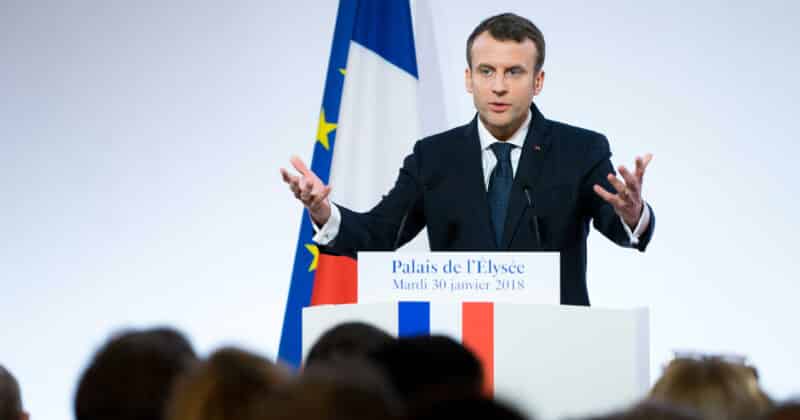

THIS SUNDAY’S second round of the French presidential election pits the incumbent, authoritarian neoliberal Emmanuel Macron, against veteran far right racist Marine Le Pen. Immediately after the results of the first round were announced, a series of demonstrations, thousands strong, took place across France, composed largely of young people, students in universities and lycées, against what they see as a choice between ‘the plague and cholera’ in the second round.
Many of the students who have occupied the universities, including the Sorbonne in Paris, and demonstrated on the streets, openly proclaim that, what they call ironically ‘the real third round’ of the elections, will be waged on the streets and in the workplaces, whoever is in the Elysée.
To the surprise of many commentators, Le Pen is running Macron a close race. Part of the reason is Macron’s arrogant, monarchical style and the fact that he has carried out a series of vicious attacks on the remaining social gains of the working class, the poor and the immigrant-origin population and unleashed repressive police action against protesters, in particular the Gilets Jaunes (yellow vest) movement in 2018.
His neoliberal reforms included those to the Code du Travail (Labour Code), the unemployment insurance, with the abolition of the direct wealth tax (ISF), cuts in personalised housing assistance (APL), and the (defeated) pension reforms. His antidemocratic attacks included transferring provisions of the state of emergency after the terrorist attacks permanently into law, and his Islamophobic campaign against ‘separatism‘.
Le Pen has spent recent years trying to shed the legacy of her fascistic father, Jean Marie, including renaming her party, the former Front National (FN) into the Rassemblement Nationale (RN). And, indeed, she has had some success with this exercise. She knows that her past alone, plus the promise to ban wearing the hijab in public, will continue to attract anti-Muslim voters.
Meanwhile, she has been assiduously courting those who would never have voted NF in the past by taking up the issues of the declining purchasing power of the working class and lower middle class and dropping policies like getting out of the eurozone or the EU itself. More problematic, especially in the context of the war in Ukraine, are her links with Putin and funding from Russian banks.
Another big scare for Macron is that a larger section of the electorate than ever is likely to abstain – even more than the over 25 per cent who did so in 2017. It seems that the ‘republican discipline’, which used to ensure voters on the left voted against the NF as an antirepublican party, even for right-wing Gaullist candidates, is a wasting asset under Macron who is widely detested as a prime example of the French political elite.
Meanwhile, the French left, those who would once have voted for the Socialist Party (PS) or the Communist Party (PCF) this time rallied to Jean-Luc Mélenchon’s left populist La France Insoumise (Unsubmissive France), rebranded for this election as the Union Populaire; giving him 22 per cent in the first round, some 7.7 million votes.
Mélenchon has urged his voters not on any account to vote for Le Pen but has refused to endorse Macron. An opinion poll shows that two thirds of his voters will abstain. He hopes to build on his success in the first round of the presidentials for the parliamentary elections on June 12 and 19, for which he holds out the frankly ridiculous idea of “imposing” himself on Macron as prime minister.
In fact, waiting for Mélenchon and focussing on electoralism would be a fatal mistake. As various movements over the last two decades have shown, mass strikes, occupations of workplaces and places of education are the way to halt neoliberal reforms.
Today, it is those who argue for a blank vote who are correct. There is no candidate standing in this election, not even one from the traditional reformist workers’ parties, that should attract the votes of the working class, the youth of the lycées and universities and those who could vote in the banlieues.
The idea that Macron is a barrier to the rise of fascism is a joke, or rather a cynical ploy, to panic voters into voting for him as the lesser evil. The problem with this argument is that it was the economic policies and social destruction wrought by Sarkozy and then Macron that fuelled the rise of the racist right and will continue to do so.
The only forces that can really take on both a racist bourgeois republic and the far right are the working class and the youth of the unis, the lycées and banlieues, who have always made up the bulk of anti-racist fighters, that saw off the NF thugs in the past and can see them off again. The trade unions and the far left need to put themselves at the head of these forces from day one of the new presidency.